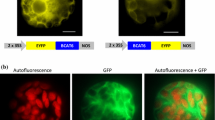Abstract
The essential amino acids lysine and threonine are synthesized in higher plants by two separate branches of a common pathway. This pathway is primarily regulated by three key enzymes, namely aspartate kinase (AK), dihydrodipicolinate synthase (DHPS) and homoserine dehydrogenase (HSD), but how these enzymes operate in concert is as yet unknown. Addressing this issue, we have expressed in transgenic tobacco plants high levels of bacterial AK and DHPS, which are much less sensitive to feedback inhibition by lysine and threonine than their plant counterparts. Such expression of the bacterial DHPS by itself resulted in a substantial overproduction of lysine, whereas plants expressing only the bacterial AK overproduced threonine. When both bacterial enzymes were expressed in the same plant, the level of free lysine exceeded by far the level obtained by the bacterial DHPS alone. This increase, however, was accompanied by a significant reduction in threonine accumulation compared to plants expressing the bacterial AK alone. Our results suggested that in tobacco plants the synthesis of both lysine and threonine is under a concerted regulation exerted by AK, DHPS, and possibly also by HSD. We propose that the balance between lysine and threonine synthesis is determined by competition between DHPS and HSD on limiting amounts of their common substrate 3-aspartic semialdehyde, whose level, in turn, is determined primarily by the activity of AK. The potential of this molecular approach to increase the nutritional quality of plants is discussed.
Similar content being viewed by others
References
Bieleski, RL, Turner, NA: Separation and estimation of amino-acids in crude plant extracts by thin-layer electrophoresis and chromatography. Anal Biochem 17: 278–293 (1966).
Black, S, Wright, NG: β-aspartokinase and β-aspartyl phosphate. J Biol Chem 213: 27–38 (1955).
Boy, E, Borne, F, Patte, JC: Isolation and identification of mutants constitutive for aspartokinase III synthesis in Escherichia coli K12. Biochimie 61: 1151–1160 (1979).
Bright, SWJ, Kueh, JSH, Franklin, J, Rognes, SE, Miflin, BJ: Two genes for threonine accumulation in barley seeds. Nature 299: 278–279 (1982).
Bright, SWJ, Shewry, PR: Improvement of protein quality in cereals. CRC Crit Rev Plant Sci 1: 49–93 (1983).
Bryan, JK: Synthesis of the aspartate family and branched-chain amino acids. In: Miflin, BJ (ed) The Biochemistry of Plants, vol. 5, pp. 403–452. Academic Press, New York (1980).
Cassan, M, Parsot, C, Cohen, GN, Patte, JC: Nucleotide sequence of lysC gene encoding the lysine-sensitive Aspartokinase III of Escherichia coli K12. J Biol Chem 261: 1052–1057 (1986).
Cattoir-Reynaerts, A, Degryse, E, Verbruggen, I, Jacobs, M: Selection and characterization of carrot embryoid cultures resistant to inhibition by lysine and threonine. Biochem Physiol Pfl 178: 81–90 (1983).
Dotson, SB, Frisch, DA, Somers, DA, Gengenbach, BG: Lysine-insensitive aspartate kinase in two threonine-overproducing mutants of maize. Planta 182: 546–552 (1990).
Duncan, DB: Multiple range and multiple F tests. Biometrics 11: 1–42 (1955).
Fluhr, R, Moses, P, Morelli, G, Coruzzi, G, Chua, N-H: Expression dynamics of the pea rbcS family and organ distribution of the transcripts. EMBO J 5: 2063–2071 (1986).
Frankard, V, Ghislain, M, Jacobs, M: Two feedback-insensitive enzymes of the spartate pathway in Nicotiana sylvestris. Plant Physiol 99: 1285–1293 (1992).
Frankard, V, Ghislain, M, Negrutiu, I, Jacobs, M: High threonine producer mutant of Nicotiana sylvestris (Spegg. and Comes). Theor Appl Genet 82: 273–282 (1991).
Fuller, MF, Mennie, I, Crofts, RMJ: The amino acid supplementation of barley for the growing pig. 2. Optimal additions of lysine and threonine for growth. Br J Nutr 41: 333–340 (1979).
Gallie, DR, Lucas, WJ, Walbot, V: Visualizing mRNA expression in plant protoplasts: factors influencing efficient mRNA uptake and translation. Plant Cell 1: 301–311 (1989).
Greve, HD, Dhaese, P, Seurinck, J, Lemmers, M, VanMontagu, M, Schell, J: Nucleotide sequence and transcript map of the Agrobacterium tumefaciens Ti plasmid-encoded octopine synthase gene. J Mol Appl Genet 1: 499–511 (1983).
Guilley, H, Dudley, RK, Jonard, G, Balazs, E, Richards, KE: Transcription of Cauliflower mosaic virus DNA: detection of promoter sequences, and characterization of transcripts. Cell 30: 763–773 (1982).
Hibberd, KA, Walter, T, Green, CE, Gengenbach, BG: Selection and characterization of feedback-insensitive tissue culture of maize. Planta 148: 183–187 (1980).
Hurst, WJ: o-phthaldehyde derivative of amino acids in cocoa beans. In: Hancock, WS (ed) CRC Handbook of HPLC for the Separation of Amino Acids, Peptides and Proteins, vol. 1, pp. 325–330. CRC Press, Boca Raton, FL (1984).
Matthews, PF, Farrar, MJ, Gray, AC: Purification and interconversion of homoserine dehydrogenase from Daucus carota cell suspension cultures. Plant Physiol 91: 1569–1574 (1989).
Matthews, BF, Widholm, JM: Regulation of lysine and threonine synthesis in carrot cell suspension cultures and whole carrot roots. Planta 141: 315–321 (1978).
Mills, WR, Lea, PJ, Miflin, BJ: Photosynthetic formation of the aspartate family of amino acids in isolated chloroplasts. Plant Physiol 65: 1166–1172 (1980).
Negrutiu, I, Cattoir-Reynearts, A, Verbruggen, I, Jacobs, M: Lysine overproducer mutants with an altered dihydrodipicolinate synthase from protoplast culture of Nicotiana sylvestris (Spegazzini and Comes). Theor Appl Genet 68: 11–20 (1984).
Nitsch, JP: Experimental androgenesis in Nicotiana. Phytomorphology 19: 389–404 (1969).
Odell, JT, Nagy, F, Chua, N-H: Identification of DNA sequences required for activity of the cauliflower mosaic virus 35S promoter. Nature 313: 810–812 (1985).
Richaud, F, Richaud, C, Rafet, P, Patte, JC: Chromosomal location and nucleotide sequence of the Escherichia coli dapA gene. J Bact 166: 297–300 (1986).
Shaul, O, Galili, G: Increased lysine synthesis in tobacco plants that express high levels of bacterial dihydrodipicolinate synthase in their chloroplasts. Plant J 2: 203–209 (1992).
Shaul, O, Galili, G: Threonine overproduction in transgenic tobacco plants expressing a mutant desensitized aspartate kinase of Escherichia coli. Plant Physiol 100: 1157–1163 (1992).
Umbarger, HE: Amino acid biosynthesis and its regulation. Annu Rev Biochem 47: 533–606 (1978).
Yugari, Y, Gilvarg, C: The condensation step in diaminopimelate synthesis. J Biol Chem 240: 4710–4716 (1965).
Author information
Authors and Affiliations
Rights and permissions
About this article
Cite this article
Shaul, O., Galili, G. Concerted regulation of lysine and threonine synthesis in tobacco plants expressing bacterial feedback-insensitive aspartate kinase and dihydrodipicolinate synthase. Plant Mol Biol 23, 759–768 (1993). https://doi.org/10.1007/BF00021531
Received:
Accepted:
Issue Date:
DOI: https://doi.org/10.1007/BF00021531




